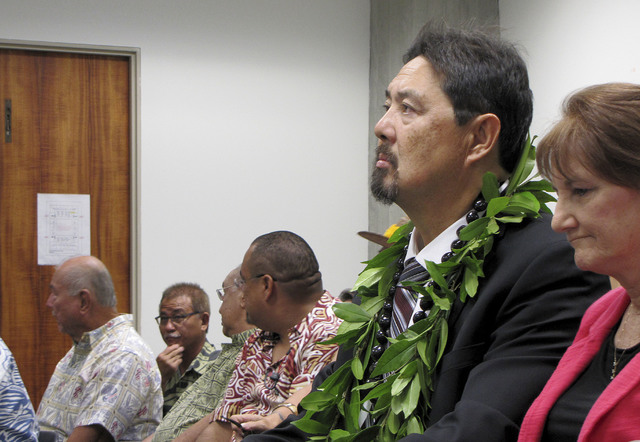Senate panel takes up Gov. Ige’s land department nominee
HONOLULU — A Hawaii Senate panel took up Gov. David Ige’s nomination of Carleton Ching to lead the Department of Land and Natural Resources, but decided after a nine-hour hearing that it still had too many questions for the nominee to take a vote.
The Senate Committee on Water and Land listened to five hours of public testimony for and against Ching before its members launched into their own questions Wednesday, and postponed making a decision on Ching’s nomination until Thursday afternoon.
Hundreds of testifiers submitted more than 1,000 pages of written testimony before the hearing, with many opposing the nominee because of his background in development. Most recently, Ching served as vice president of community and government relations for Castle & Cooke Hawaii, a development firm where he worked for more than a dozen years.
Opponents couldn’t understand how a career developer could switch gears and lead a department charged with protecting the island state’s natural resources, a concern echoed by some lawmakers on the panel.
“His career track has been the polar opposite of the DLNR mission,” said Randy Awo, who recently retired after serving for 27 years in the enforcement division of the Department of Land and Natural Resources.
Ige selected Ching to lead the department, which is charged with conservation of land and water, a mission most opponents see as in direct conflict with developers.
“Can you change hats? Can you change your passion?” asked Senate President Donna Mercado Kim.
“Born and raised in these islands and being part Hawaiian, I have an innate and deep respect for this land, for this natural resource,” Ching said during his opening remarks. “To honor and respect our culture, to learn from our past.”
“Providing shelter for Hawaii’s families is a good thing,” Ching continued. “We built neighborhoods. We built community. We allowed families to build their equity.”
“I will engage public and private stakeholders to find a balance, to find that sweet spot,” Ching said.
Part of the hearing centered on a chapter in Ching’s past when he played a role negotiating leases for residents of Waiahole Valley, who were facing eviction from a private land owner. The state bought the land before Ching joined the Hawaii Housing Authority, and then Ching played a role working out agreements between parties.
“I have to say thank you to Carleton, ‘cause he allowed us to have this taro patch land, and we’re trying to take care of it,” said Calvin Ho, a taro farmer.
But Ching faced scrutiny for his volunteer work as a board member on the Land Use Research Foundation, a group that lobbied against historic preservation and protecting critical habitats and advocated for fast-tracked development that would bypass public and environmental scrutiny.
Ching said he didn’t always agree with the positions the organization took.
“I was unaware of the details, to be quite honest with you,” Ching said about the group’s support for a fast-track development policy.
Lawmakers on the panel pressed Ching on his knowledge of the department’s responsibilities how he would prioritize competing interests of development, conservation and the rights of cultural practitioners. Ching replied that he would handle each situation on a case-by-case basis, and referred often to the need to weigh the costs and benefits of using lands in particular ways.
Critics and lawmakers have questioned whether Ching has the right experience to carry out the department’s mission.
“You don’t hire a baseball player to serve as your football coach. Not Division I,” said David Frankel, chairman of the Sierra Club Hawaii Chapter. “You don’t hire your football coach based on character.”
Ige defended his nomination, saying Ching is up to the challenge.
“I do see a leader in him,” Ige said. “He wants to leave the state better than he found it, just like I do. I think we all do.”
“I do see a leader in him,” Ige said. “He wants to leave the state better than he found it, just like I do. I think we all do.”


